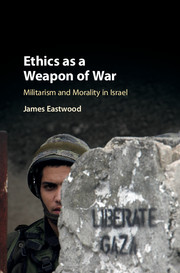Book contents
- Ethics as a Weapon of War
- Ethics as a Weapon of War
- Copyright page
- Contents
- Figures
- Tables
- Acknowledgements
- Introduction: ‘The Most Moral Army in the World’
- 1 Militarising the Ethical Turn
- 2 ‘The Spirit of the IDF’
- 3 ‘Keeping a Human Image’: Teaching Military Ethics in the IDF
- 4 ‘Meaningful Service’: Ethics and Pedagogy at Pre-military Academies in Israel
- 5 Between Guilt and Anxiety: Collecting Testimony in Breaking the Silence
- 6 ‘Creating a Moral Conversation’: The Public Activism of Breaking the Silence
- Conclusion: Towards an Anti-militarist Ethics
- List of Interviews
- Book part
- Bibliography
- Index
- References
Bibliography
Published online by Cambridge University Press: 21 September 2017
- Ethics as a Weapon of War
- Ethics as a Weapon of War
- Copyright page
- Contents
- Figures
- Tables
- Acknowledgements
- Introduction: ‘The Most Moral Army in the World’
- 1 Militarising the Ethical Turn
- 2 ‘The Spirit of the IDF’
- 3 ‘Keeping a Human Image’: Teaching Military Ethics in the IDF
- 4 ‘Meaningful Service’: Ethics and Pedagogy at Pre-military Academies in Israel
- 5 Between Guilt and Anxiety: Collecting Testimony in Breaking the Silence
- 6 ‘Creating a Moral Conversation’: The Public Activism of Breaking the Silence
- Conclusion: Towards an Anti-militarist Ethics
- List of Interviews
- Book part
- Bibliography
- Index
- References
- Type
- Chapter
- Information
- Ethics as a Weapon of WarMilitarism and Morality in Israel, pp. 259 - 262Publisher: Cambridge University PressPrint publication year: 2017



